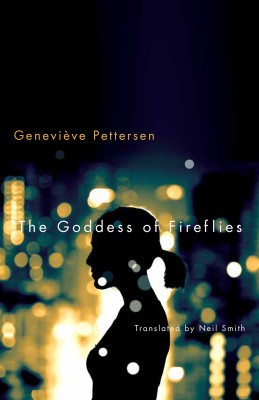Set in Chicoutimi-Nord in the mid-nineties, Geneviève Pettersen’s first book is a harrowing coming-of-age novel about a teenage girl whose life quickly spins out of control. Winner of the 2015 Grand Prix littéraire Archambault and a bestseller in its original French, The Goddess of Fireflies is narrated by Catherine as she navigates the eventful year between her fourteenth and fifteenth birthdays, a year full of change, violence, substance abuse, and star-crossed romance.
The novel opens at Catherine’s fourteenth birthday party, where her inebriated father spontaneously gives her a cheque for a thousand dollars before totalling her mother’s jeep. Catherine is unaffected by the scene, using it instead as an opportunity to introduce the reader to her father, a crooked lawyer, and her mother, a former model. The pair had been bitterly arguing for as long as she could remember.
While her parents’ marriage implodes, Catherine begins hanging out at the mall, “the hole,” and other hideaways for underage drinking and debauchery. Her portrayals of the kids she encounters are one-dimensional, but authentically teenaged. There’s Melanie the bully, Pascal the heartthrob, and Eve the bad apple. These characters are sweet and selfish by turn, and Catherine’s loyalties change quickly. But while her friendships are disposable, Catherine remains devoted to the PCP-variant mesc, which she first tries at a party in the woods. Soon, her life is ruled by her appetite for the narcotic, and she lovingly describes the different varieties she ingests. Along with drugs, the novel is full of sex and rock ’n’ roll, with many references to nineties’ pop-punk bands like Lagwagon, NOFX, and The Offspring, and alternative rock such as Sonic Youth and Les Wampas. These are bands that reflect Catherine’s alienation, offering a discordant soundtrack to her drug-fuelled bacchanalias and teen romances. The music references increase as she falls for Kevin, a music and horror film obsessive with a pompadour and tight jeans.

The Goddess of Fireflies
Geneviève Pettersen
Translated by Neil Smith
Véhicule Press
$19.95
paper
200pp
9781550654370
In the original French, Pettersen prioritized using words and expressions particular to the Saguenay. In an interview with her last year, La Presse included a glossary of terms used in the book. While we necessarily lose access to this unique argot in the English version, Neil Smith ably translates the novel into a more universal English teenage talk. The original, like the translation, is liberally peppered with swearing, as well as offensive epithets against Indigenous people, women, and homosexuals. Perhaps intended to shock, and likely true to the diction of a Saguenay teenager in the 1990s, this aspect of the novel nevertheless becomes incredibly tiresome.
After the death of a friend and the discovery of her habit by her parents, Catherine faces the consequences of her wild year. But even so she shows little remorse. Finally, during a fishing trip with her father on her fifteenth birthday we begin to see the first signs that Catherine might be changing for the better. As the pair return to Chicoutimi they witness the Saguenay flood at its height. The book ends with a powerful image of destruction, a symbol of the tenuous position that Catherine still occupies as a teenage girl stepping back from the brink. mRb






0 Comments